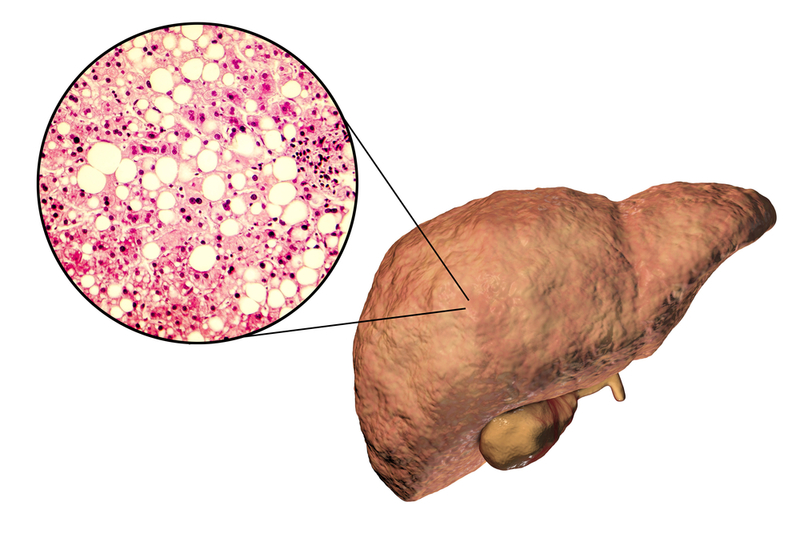Nonalcoholic fatty liver disease: New drug proves 'safe' and effective
Healthline/Medical News Today Aug 01, 2019
A new clinical trial tests the benefits of an oral drug for people with nonalcoholic fatty liver disease (NAFLD) and yields very promising results.

In the United States, 30%–40% of all adults are living with NAFLD. In Europe, 20%–30% of the general population have NAFLD, and the numbers are on the rise. In NAFLD, which is one of the most common forms of liver disease, an excessive amount of fat builds up in the liver. This fat is not the result of excessive alcohol consumption.
NAFLD can progress into nonalcoholic steatohepatitis (NASH), wherein liver inflammation and liver cell damage accompany the fat buildup. Up to 12% of the US population have NASH, and this condition can progress into cirrhosis and fibrosis.
Currently, the therapeutic options for NAFLD are limited to dietary and lifestyle changes, such as losing weight and exercising more. There are currently no drugs that can treat NAFLD.
However, new research points to a viable pharmacological treatment. Scientists led by Dr. Stefan Traussnigg, from the Department of Medicine III at MedUni Vienna, in Austria, tested the benefits of norursodeoxycholic acid (nor-urso) in a placebo-controlled clinical trial. Dr. Traussnigg and colleagues published their findings in The Lancet Gastroenterology & Hepatology.
Studying the benefits of nor-urso for NAFLD
Nor-urso is a modified version of ursodeoxycholic acid, a common oral drug that can alter the makeup of bile and may dissolve gallstones. Previous research has shown that using nor-urso to produce bile acid synthetically helps treat another incurable liver condition, called primary sclerosing cholangitis.
Now, Dr. Traussnigg and the team conducted a multicenter, double-blind, placebo-controlled, randomized, phase 2 clinical trial to test the benefits of nor-urso in 198 NAFLD patients in various hospitals and medical centers throughout Austria and Germany. The scientists randomly divided the participants into:
- A group that received nor-urso capsules for a 500-milligram (mg) daily dosage (67 participants)
- A group that received 1,500 mg of nor-urso daily (67 participants)
- A group that received a placebo (64 participants)
The participants took the treatment or placebo for a period of 12 weeks. The researchers clinically followed the participants for another 4 weeks after the intervention.
The primary outcome that the researchers looked for were levels of alanine aminotransferase (ALT)—an enzyme that resides mainly in the liver. ALT levels are a good measure of liver damage, and assessing them is a standard test for this type of damage.
1,500-mg dosage 'safe and well-tolerated'
The results of the trial revealed that nor-urso improved liver health, as reflected by ALT levels. The effects were dose-dependent, so the group that received 1,500 mg of nor-urso daily benefited the most from the drug, and the reduction of ALT serum levels was the most significant in this group.
A similar number of "serious adverse events"—such as gastrointestinal disorders, abdominal pain, headaches, and infections—occurred in all groups, including the group that had taken the placebo.
In conclusion, a 1,500-mg dosage of nor-urso "resulted in a significant reduction of serum ALT within 12 weeks of treatment, when compared with placebo," write the authors. "Norursodeoxycholic acid was safe and well-tolerated, encouraging further studies," they assert.
Compound works in a 'personalized' way
The trial's authors explain the mechanisms behind nor-urso's beneficial effects. Study co-author Dr. Michael Trauner says that synthetically created bile acid protects the liver from inflammation. He goes on: "The bile acid circulates through the body like a steroid hormone and regulates many metabolic processes. In fatty liver disease, it is as if a bile acid signal resistance develops, so that these processes no longer function properly."
Nor-urso, however, "re-intensifies the hormone effect of the bile acid." This improves a patient's outlook and the progression of the disease. Dr. Trauner also explains that "utilizing the signal properties and hormone effects of bile acids" is "in the spirit of personalized medicine" and a crucial step forward in the pursuit of individualized treatments.
In the near future, the researchers plan to test the benefits of nor-urso for cardiovascular disease, as this is the leading cause of death among people with fatty liver disease. Nor-urso could improve cardiometabolic health and life expectancy overall, say the researchers. "It would be logical to expect that, and we are optimistic. But we have not yet verified it," Dr. Trauner says.
-
Exclusive Write-ups & Webinars by KOLs
-
Daily Quiz by specialty
-
Paid Market Research Surveys
-
Case discussions, News & Journals' summaries